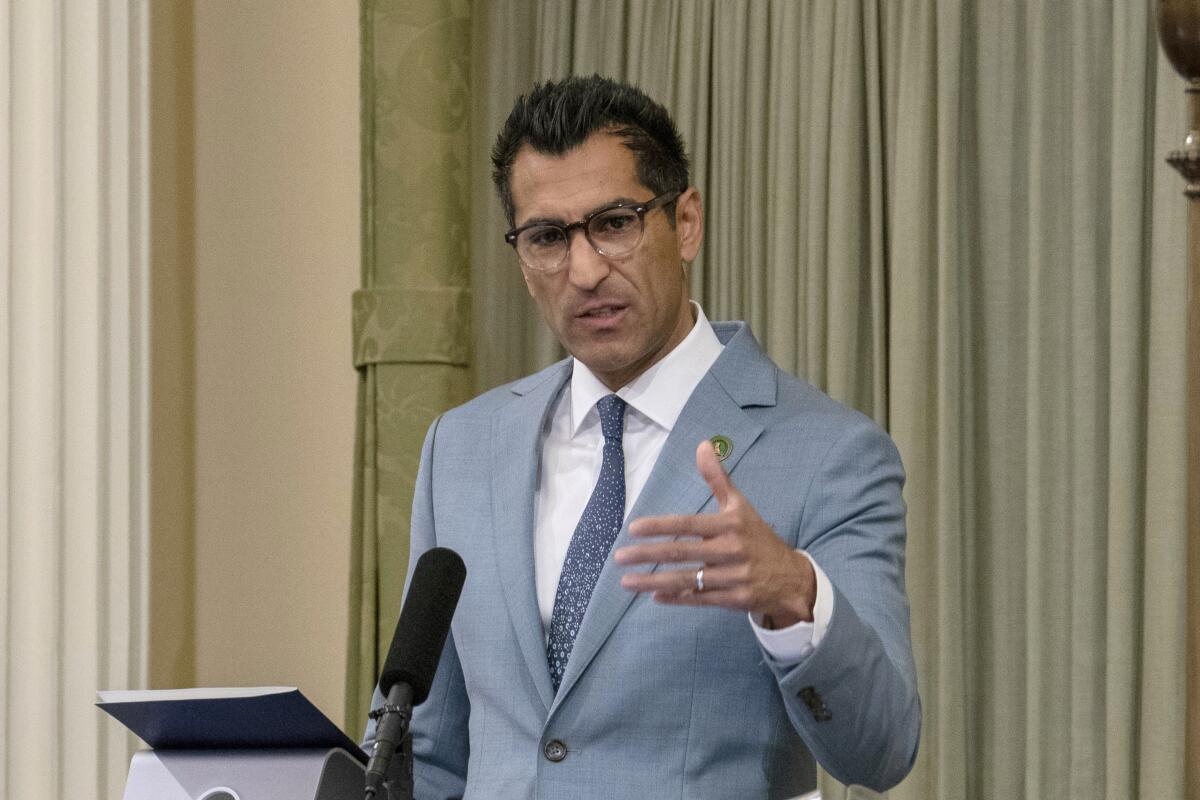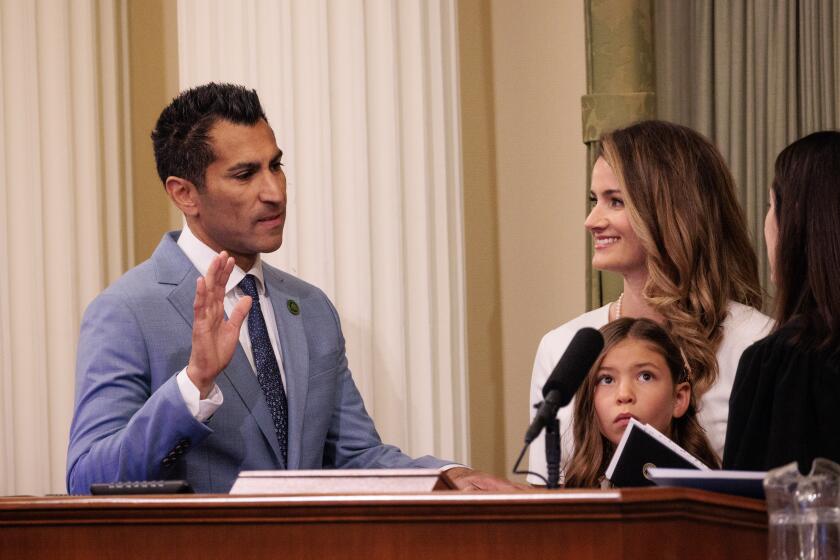Column: Raising Cain in Sacramento over ease of raising taxes

SACRAMENTO — What’s good for the conservative goose is good for the liberal gander.
That’s the liberals’ pitch anyway as the state Legislature grapples over the ages-old issue of taxes in the hectic final days of this year’s legislative session.
And since libs control the Legislature, their view is likely to prevail. But it’s no cinch. They’re dealing with politically sensitive stuff. Some moderate Democrats could balk.
Here’s another way to simplify this highly complex tussle using a different old cliche: Democrats are attempting to give Republicans a dose of their own medicine.
The lesson for Republicans: Be careful what you concoct.
OK, what this involves is the latest battle in the perpetual war between business interests and organized labor — represented by Republicans and Democrats — over taxes.
Specifically, the question is how hard — or easy — should it be to raise state and local taxes. Republicans are trying to make it much tougher. Democrats essentially want to keep the current rules.
By taking over as Assembly speaker, Robert Rivas becomes the first rural Californian in a generation to hold the powerful post in the state Capitol.
Business and anti-tax interests have collected 1.4 million voter signatures and qualified an initiative for the November 2024 state ballot that would require, among other things, a two-thirds vote by citizens to increase certain local taxes.
Currently, local general taxes that can be spent for any purpose may be raised on a simple majority vote by citizens.
A local special tax that’s earmarked for a specific purpose requires a two-thirds vote — at least they all did until recent court decisions.
Now it appears that special taxes proposed through the initiative process by local citizens — such as a labor union — can be passed on a majority vote. Special taxes proposed by government entities still need a two-thirds vote.
The business interest ballot measure would return the rules to what they were before the court decisions: All special taxes would require a two-thirds vote.
But the ballot initiative also does much more.
It would make raising state and local government fees a lot harder, and potentially categorize some fees as taxes.
And a biggie: Any state tax increase passed by the Legislature would need to be approved by California voters.
Now, the Legislature can hike state taxes on its own. But it requires a two-thirds vote. That was dictated by Proposition 13, the landmark property tax limitation initiative passed in 1978.
Proposition 13 required two-thirds votes for taxes in the Legislature and local communities, but itself was passed by slightly less than two-thirds of voters.
Before Proposition 13, the Legislature could raise taxes on a simple majority vote. And it occasionally did raise or lower them to adjust to current economic and revenue conditions. It has lost that easy ability to update the tax code, now antiquated.
But back to the goose and the gander.
Democrats have countered the tough-on-taxes initiative with their own gotcha measure for the March primary ballot. It would require that any ballot proposal to raise the voter threshold for tax hikes also be passed by the same voter threshold.
The Democratic measure, ACA 13, “is about fairness,” new Assembly Speaker Robert Rivas (D-Hollister) asserted in a statement when the proposed constitutional amendment was suddenly introduced last week by Assemblyman Christopher Ward (D-San Diego).
“This important bill stops an unfair double-standard and protects the majority vote.”
Or as Assemblyman Marc Berman (D-Menlo Park) told ACA 13 opponents at a committee hearing: “The majority vote is OK for things you support, but not OK for things you don’t support.”
Under current law, the anti-tax initiative sponsored mainly by the California Business Roundtable can be passed in November 2024 by a simple majority of state voters. But if the Democratic ballot measure passes first in March, the initiative will require a two-thirds supermajority — probably too high a bar in a presidential election that’s bound to draw a high turnout of Democratic voters.
But first ACA 13 must pass the Legislature before it adjourns Sept. 14. And that will require a two-thirds vote of each house — a high hurdle even though Democrats hold supermajority control.
Anti-tax interests are pitching their initiative as a protector of Proposition 13, although the connection is flimsy at best. Neither it nor ACA 13 has anything to do with property taxes.
“Proposition 13 is still the third rail of California politics and people don’t want to go against it,” says Scott Kaufman, lobbyist for the Howard Jarvis Taxpayers Assn., named after Proposition 13’s principal advocate.
The measure cleared its first committee shortly after being introduced. It was approved on a party-line 5-2 vote. But one Democrat, Assemblywoman Blanca Rubio of Baldwin Park, abstained because she feared the proposal could undermine Proposition 13.
“When we talk about Proposition 13, legislators get very concerned very fast,” says business roundtable President Rob Lapsley. “This thing is far from over.”
But on the Democratic side, Rivas has “speakerized” the issue by weighing in and pushing. That’s usually significant, but this rookie speaker hasn’t been tested yet.
Local governments are lobbying hard for ACA 13.
The powerful Service Employees International Union also is pushing. Many of its members are public employees. Making it tougher to raise taxes would cut into revenue needed for their pay hikes and benefits.
Personally, I think California taxes are too high and definitely should not be raised.
But I’m opposed to supermajority vote requirements for taxes. They allow a minority of voters to block the will of the majority. That doesn’t seem democratic.
More to Read
Sign up for Essential California
The most important California stories and recommendations in your inbox every morning.
You may occasionally receive promotional content from the Los Angeles Times.












